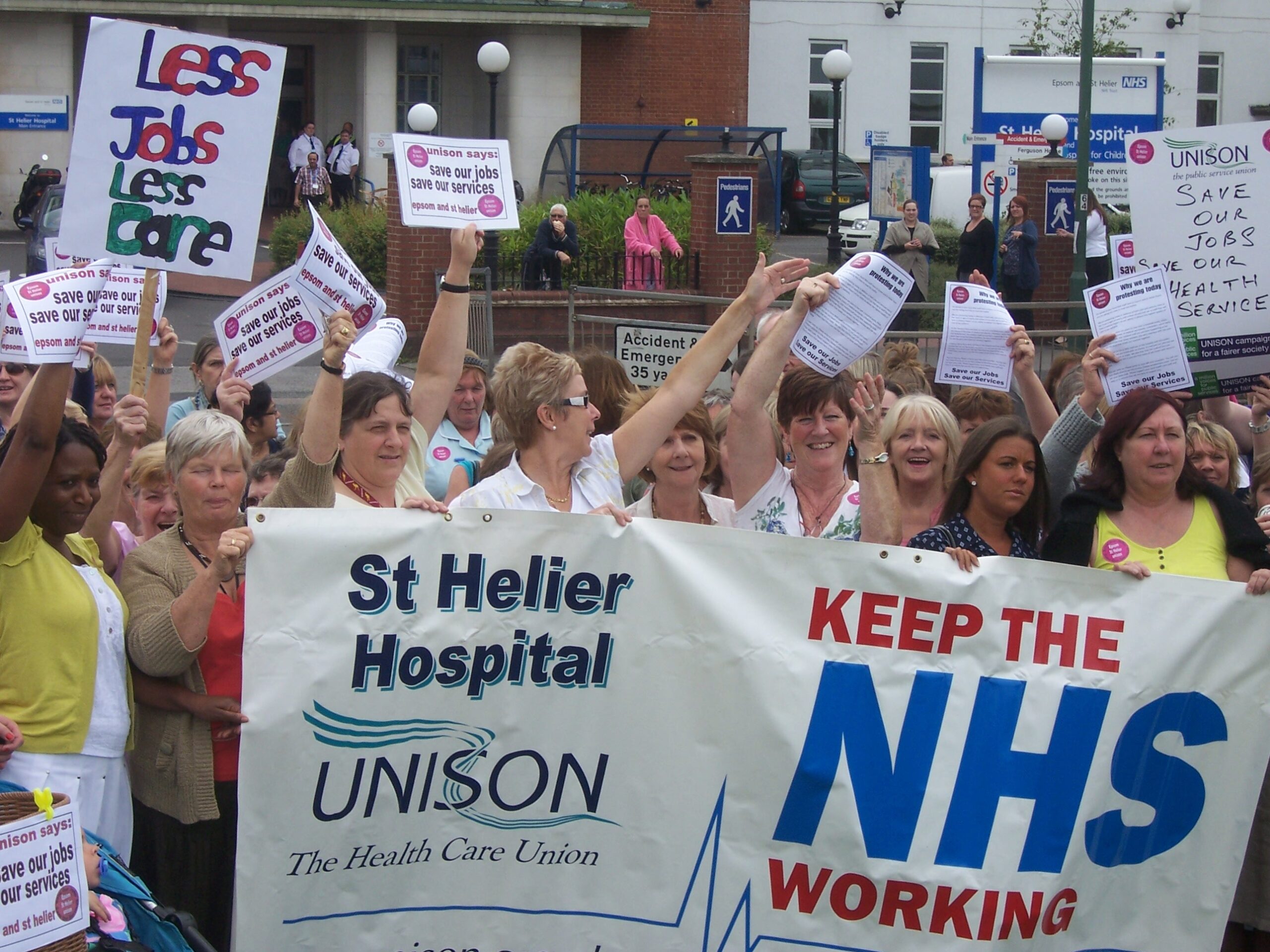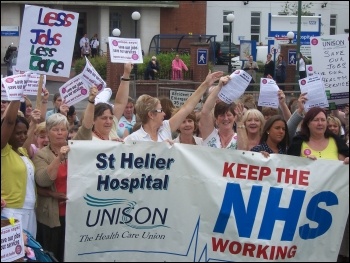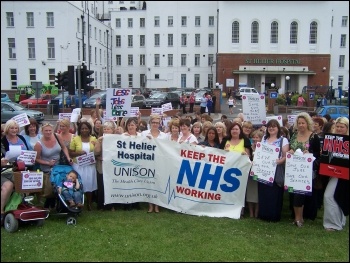Feature
Stop the NHS massacre
It has been well documented that the National Health Service (NHS) is under attack and in England faces its total destruction through the Health and Social Care Act. But exactly what is happening, why and what can be done about it? Socialist Party health worker activists, including Terry Pearce of the Save Heatherwood Hospital campaign (personal capacity) investigate.
What is happening to the NHS?
The future of the NHS hangs in the balance. Tory Health secretary Andrew Lansley’s hated and discredited Health and Social Care Act threatens to accelerate the cuts and privatisations that are already crippling the NHS, to breaking point.
The government’s privatisation and austerity agenda has already resulted in ward closures and increased pressure on services and health workers around the country, as well as attacks on pay and pensions.

NHS demonstrations 3 March 2007, photo Paul Mattsson
The coalition has spent £1.7 billion on re-organising the NHS. £20 billion cuts to health services have been dressed up as ‘efficiency savings’. Doctors.net.uk, a professional networking site to which almost all British doctors belong, asked medics: “Have cuts to staff and/or services affected patient care in your departments, area or surgery during the last 12 months”.
Of the 664 doctors who responded 527 (79%) said yes. Among 440 hospital doctors, 359 had seen cuts, while 168 of 224 family doctors said the same. What the cuts really mean can be seen, for example, in South London. In Lewisham, almost £500,000 has been chopped from the budget for children’s mental health services. In Lambeth, the Primary Care Trust has cut the number of patients eligible to receive free incontinence pads.
How will accountability in the NHS change?
Clinical Consortium Groups (CCGs) which are GP-driven will become responsible in April 2013 for around £60 billion (about half) of the health budget. CCGs will be both commissioners and suppliers of health services – a clear conflict of interest.
They will be virtually unaccountable with the abolition of LINKS (elected, independent Community Health Watchdogs) to be replaced by Healthwatch, commissioned by Local Authorities and likely to be appointed or even run by private health companies.
In other words there will be no real independent accountability of either GPs or local authorities. There will be no way of calling GPs to account; antagonism between patients and doctors will grow as privatisation begins to creep into GPs’ surgeries.
Also the Secretary of State for Health will no longer be ultimately responsible for the NHS – it will be the CCG in each area. This means that if the public are unhappy with the NHS, we can’t vote against changes at the ballot box.
So, does it mean privatisation?
Basically, yes. Although CCGs do not come online until next April we are already seeing a glimpse of the future. A health centre in York was reported to have written to patients informing them of some services like minor operations that would no longer be available on the NHS and instead offered to carry out the procedures for “a fee”. This is just the tip of the iceberg. As funding is cut and private involvement increases we will see much more of these arrangements.
The vultures of privatisation are circling. Hinchingbrooke Hospital in Cambridgeshire has already been taken over by a non-state provider. Circle has become the first private company to take over a NHS hospital. The company has already registered its determination to expand its empire. This kind of arrangement will only become more commonplace.
The very principle of free treatment for all, funded by general taxation and publicly run, is at risk. The heart of the welfare state is threatened. The private sector will pick off the profitable bits of the NHS as the remainder of services suffer cuts and become fragmented.
But 75% of the population don’t want the private sector in the NHS. Why is the government pushing ahead in the face of such huge opposition?
Privatisation paves the way for a decimation of wages and conditions of health workers and is being prepared for by cuts now. And it is part of the Tories’ wider agenda of cutting the welfare state to the bone – making ordinary people pay for the economic crisis.
It is also because of the dilemma which confronts ‘modern’ capitalism, of restricted opportunities to invest profitably in Britain’s depleted manufacturing sector. They therefore look hungrily to invest in privatised industries – not just health, but other sections as well. Even if this means a more expensive, less efficient, worse service – which it will – nevertheless it could be a profitable outlet for the £750 billion presently locked up in the vaults of big business.
Another aspect of why the politicians are so determined to push ahead is that many of them stand to directly benefit from privatisation in the health service! In the House of Lords, their Lordships with interests in private healthcare came out of virtual retirement to record their support for the Health Bill.
More than one in four Tory Lords and one in six Labour Lords, as well as a numebr of MPs from all three parties, have interests in private health companies or insurers. Baroness Cumberlege of Newick, former Tory health secretary, who runs her own lobbying firm which works “extensively” with major pharmaceutical interests, has recorded votes on just 22 days this year. But she managed to vote on every occasion during the course of the Health Bill.
What will the changes mean?
Services will suffer as cuts bite, even before the reforms come in. GPs are beginning to fear for the future. According to a poll of 814 GPs by the BBC, only 12% thought the reforms would improve things – down from 23% in 2011.
A combination of cuts to staff and services, together with fragmentation and privatisation will lead to a decline in the quality of service. In many areas, communities are facing closure of wards and hospitals, often leading to patients having to travel longer distances for treatment. The previous Labour government started the rot by massively expanding privatisation. This government threatens to go even further.
More and more treatment for minor ailments will no longer be available on the NHS. There will be less resources to spend on high risk but essential diagnostic procedures. Up to 50% of beds in NHS hospitals could be turned over to private patients meaning longer waits and a second rate service for the rest of us.
Patients will be forced into the private sector. There is a clamour from the rightwing for charges to be introduced for visits to GPs. This is the slippery slope to a USA-style health service.
What is being done about it?
During the Health and Social Care Act’s passage through parliament it faced vocal opposition from a variety of sources. Labour leader Ed Miliband opposed the bill but reassured big business that the NHS under Labour would continue “using the private sector where appropriate”.
Andy Burnham, shadow health secretary, made similar points when he spoke at Unison’s health conference. As its previous record shows, Labour has no opposition to the privatisation of the NHS.
There have been sizable demonstrations in support of local hospitals and services threatened with cuts and closures. Some campaign groups have focused on lobbying MPs and Lords. This can be a useful tactic to force politicians to feel the strength of opposition, but only as part of a much bigger movement. The priority must be a campaign that mobilises the mass anger at the destruction of the NHS. Central to that must be health workers themselves, and the trade unions they are organised in.
What can the unions do?
The TUC has called a national demonstration against the cuts on 20 October. This demonstration should also take up the demand to save the NHS. Last year’s TUC demo (which brought 700,000 onto the streets of London in a massive show of strength against cuts) shows the authority the trade union movement has when it gives a lead.
That demonstration led the way to strike action in June and November 2011, and similarly a demo for the NHS must only be the start of a trade union-led campaign of industrial action. A well built for demo would bring all the local NHS campaigns together, but even more importantly, it would give confidence to NHS workers themselves to fight.
The health unions should then use that increased confidence to organise industrial action. This could ideally be linked with other public sector unions striking against austerity, to put as much pressure on the government as possible. The National Shop Stewards Network is campaigning for a one day general strike. This is the best way to defend the NHS – by showing that workers will fight.
The pension strike on 30 November included a new generation of NHS workers who had never taken industrial action on that scale before. Unfortunately the militant mood of members on the day has not been reflected since by the union leaderships. Nonetheless, the basis is there to build a fighting campaign among health workers.
The task facing us as trade unionists is to turn the undoubted anger that exists within the NHS and in our communities into a force which can stop the Con-Dems in their tracks. A major part of this fight must be the building of strong, fighting union branch organisations and shop stewards committees within hospitals.
What did last year’s strikes achieve?
On 30 November joint union action and solidarity in well organised stewards committees delivered higher turnouts on strike and thousands of new union members, who joined because the unions were seen to be taking up the fight.
Sadly, this basic lesson of trade unionism has not been learned by the Unison leadership, who after praising the strike and pointing out its undoubted success, proceeded to enter talks with the government and started to downplay the numbers taking action and the effectiveness of the strike within the NHS.
Despite this lack of leadership Unison members narrowly voted to reject the shabby pension deal offered to them in early 2012. This vote, added to the Unite, GMB and the BMA’s decision to take action, if limited, should be used to raise the demand for further action on pensions.
If further action does not take place on pensions it would be wrong however to view the pensions strike as a final defeat for activists and the shop stewards movement. The strike showed we have the power within the workplace and support within wider society. Thousands of workers flocked towards the unions when they were seen to be fighting back and many of those have become active within the union.
Will the NHS be safe if we force the government to back down from the Health and Social Care Act?
We have already suffered over three decades of continuous underinvestment and privatisation in the health service. The previous Tory government of John Major introduced privatisation via the ‘internal market’ in the NHS, which New Labour intensified. They brought us the scandal of PFI, currently taking over £1.5 billion out of the NHS every year. Bigger hospitals were encouraged to become Foundation Trusts, acting as businesses, independent of NHS control.
All the latest attacks have to be stopped. We have to fight to regain what was lost in the past – but also for a completely publicly funded, democratically run NHS. Successive governments keep coming back for the NHS – to privatise, to cut, to destroy. It is clear that a political alternative is needed to represent all those fighting cuts and privatisation. The Trade Unionist and Socialist Coalition is an important step towards this.
This is a rich country – just the richest 1% own £1 trillion. It would be ludicrous to suggest that we can’t provide good quality healthcare for all those who need it. But while profit for a tiny minority is put before the needs of the rest of us, we’ll never achieve that.
Fundamentally we need a socialist NHS to provide for everyone’s health needs – free at the point of use and under democratic control. That means restoring the NHS as a service – run and planned locally and nationally by democratic committees that include representatives of NHS workers and the local community.
Cash is needed to cancel the cuts and end the chronic underfunding that has undermined the NHS over years. Nationalising the pharmaceutical and medical supply industries under working class control and management could assist in this. Of course this would have to be combined with a wider socialist programme to end poverty and inequality – the biggest killers and causes of ill-health.
How can health workers strengthen our unions at local level?
Adrian O’Malley, branch secretary of Unison, Mid Yorkshire Health Branch, Service Group Executive – Health Yorkshire and Humberside (personal capacity) talks about his own branch:
Our Unison branch has maintained, throughout the last 30 years, its monthly meetings structure and a functioning shop steward network. We have also managed to keep the local staff side going with monthly meetings of stewards from Unison, Royal College of Nursing, Unite, Society and college of Radiographers, Chartered Society of Physiotherapy, and the smaller unions.
This has not only enabled us to put up strong opposition to the Trust management when it has been needed but ensured that we had lively picket lines and a good turnout on the 30 November strike day despite the bullying of union members which was rife within the Trust.
Our branch had its best year’s recruitment ever in 2011 which has continued in 2012 as we face cuts of £24 million and attacks on our terms and conditions. We have also got eight new stewards who have become reps – not because they want to go on union ‘jollies’ but because they see the need to fight for their jobs and the NHS. Our local staff side has recently lodged two disputes and is committed to joint industrial action if necessary.
This is the task facing every NHS trade unionist – building shop stewards committees at branch level which are capable of fighting local Trust management.
With right wing union leaders who provide no national strategy the need for solidarity action from below has never been greater. We need to learn the lessons of 30 November and build a movement of shop stewards and activists that will stop the Con-Dems in their tracks.
Pressure from below forced them to call the 30 November strikes. If they don’t respond to further pressure we must fight for a leadership that will.










